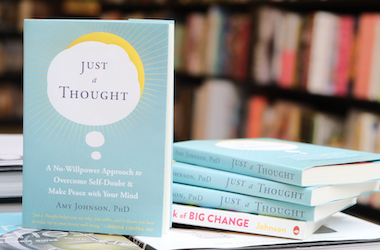I recently spoke with a woman who was holding herself back because she was afraid that if she was too successful, she would make others  uncomfortable. It was the old “Who do you think you are?” mentality—who did she think she was to do big things in life?
uncomfortable. It was the old “Who do you think you are?” mentality—who did she think she was to do big things in life?
Those weren’t her thoughts or her questions. They were her mother’s. Her mother handed them to her her 3 or 4 decades ago.
She intellectually knew it was just her mom’s insecure thoughts and not anything she really had to worry about, but she didn’t deeply see it because it kept impacting her. She clearly saw the lack of logic, but it takes a lot more than poking holes in logic to experience real change.
As we talked more about it, it became clear that there was one tiny little piece of the equation she was missing.
She thought “Who do you think you are?” was her mom’s reaction to her. In her mind, she was loud, brash, and “out there”, and that made her mother uncomfortable. What she had been telling herself for 30 years to feel better about things was “That was only mom’s reaction—it won’t be everyone’s reaction”.
And as you might imagine, that didn’t cut it. That alone was not enough to give her the freedom to be herself because she was still assuming that some people will be turned off by her, and that her mom was turned off by her, and those aren’t pleasant thoughts to entertain.
What she didn’t fully see was that her mother’s feelings toward her were 100% about her mother’s concerns with “who do you think you are?” and not at all about her daughter at all.
They were not her mother’s reaction to “I have a bold daughter”. They had zero to do with my client, the daughter, and everything to do with the thinking her mother experienced.
Her mother would have asked “Who do you think you are?” no matter what my client had been like, no matter how she lived her life, because that’s where the mother’s thinking was at that time.
If my client had been only mildly successful, her mother would have asked “Who do you think you are?”
If she had been a meek little wallflower, it would have been, “Who do you think you are?”
“Who do you think you are?” was her mother’s narrative. It may have also been her mother’s mother’s narrative, who knows.
It is the story of many parents who innocently inherited it from their parents.
But since this one shining woman saw that she plays absolutely no role in other people’s thinking, it’s no longer her narrative. It doesn’t have to be yours either.
This post was originally published in January 2014.





